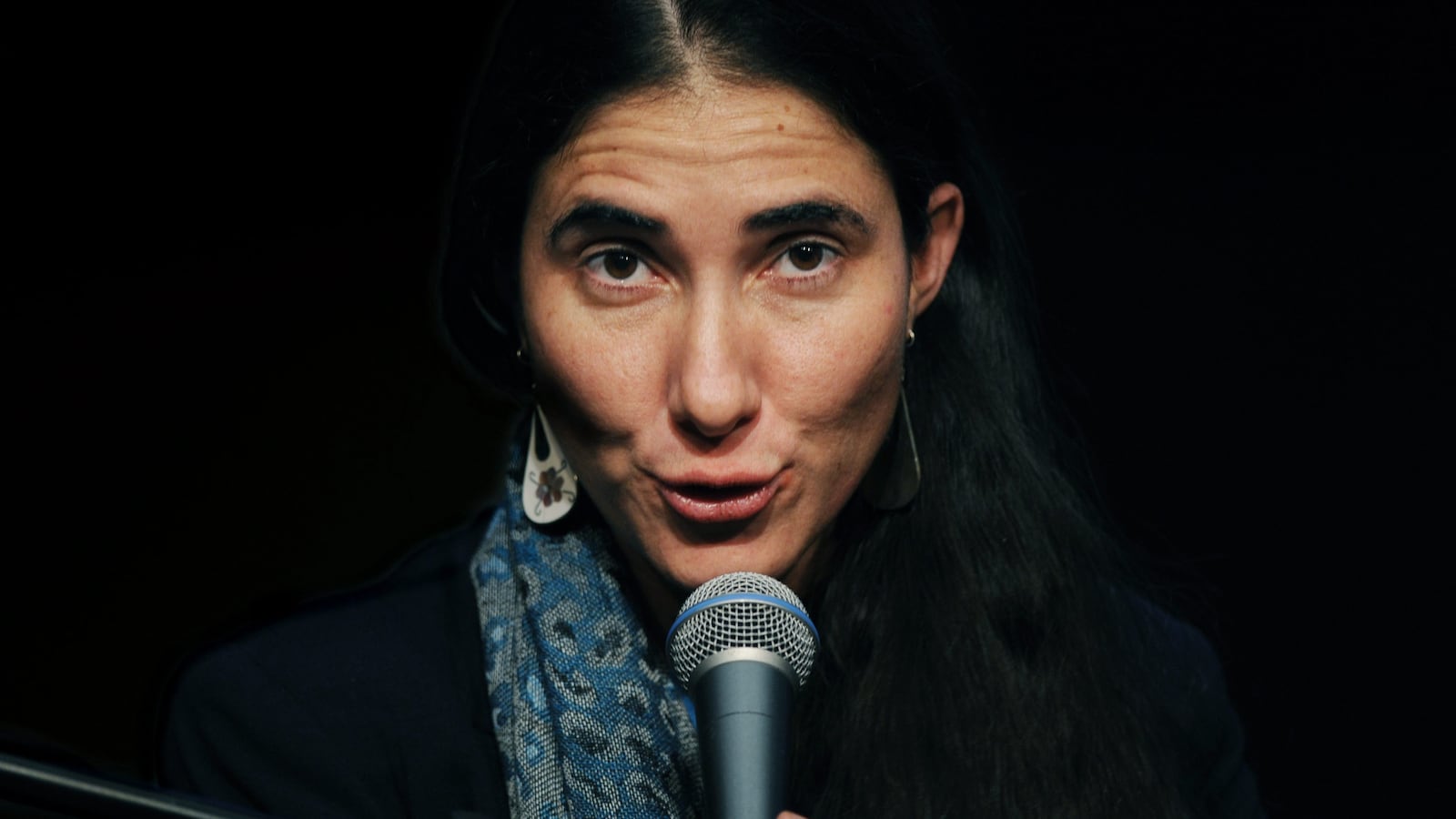An anticipatory hush settled over the Columbia auditorium, bulbs flashing and cameras clicking. The blogger had finally arrived.
Stepping foot on U.S. soil for the first time, 37-year-old Cuban dissident Yoani Sánchez was in New York to accept an invitation from the university’s journalism school—four years late, since she’d been repeatedly denied an exit visa by the Cuban government. Finally able to speak to the school’s staff and students face-to-face, Sánchez was ready to dish on life in Cuba, how Americans can help, and how she manages to get her message out under the thumb of an authoritarian regime.

The widespread lack of Internet access in Cuba is still a mystery, Sánchez said in response to one of the first questions. For many years, the government blamed it on the U.S. embargo, but Cubans questioned that “very absurd” justification after the U.S. built a fiber-optic cable to Venezuela in 2011. For the past two years, then, citizens have been demanding, where’s the cable?
But Sánchez has managed to run a blog anyway.
For several years, she said, she has been able to post to her widely read online outpost and to Twitter by pretending to be a German tourist and sneaking into Havana hotels where Cubans are not permitted. There, she uses the Internet connection to download and send out her content to her supporters around the world, who would update the blog, Generación Y, which chronicles the daily realities of life in Cuba. Today Generación Y is translated into over 17 languages, with hundreds of thousands of fans worldwide.
“I consider myself a specialist in getting on the Net while not having access to the Net,” Sánchez boasted, and added that Cubans are well versed in “finding a way when there is no way.”
She held up a red thumb drive. One day there will be a statue in honor of democracy in Cuba, she said, and the statue will be of a memory stick.
This is how it works: whoever gets momentary access to the Internet in Cuba uses the time to download information onto a memory stick and then shares it—“the flu strategy,” Sánchez called it. For the first time technology has been able to crack a hole in the “fierce, monopolistic wall” that the government has exercised over the media in Cuba, she said.
A Columbia student remarked that when she was going to visit her cousins in Cuba, they did not ask for clothes or gifts—they only wanted flash drives, so that they could download Justin Bieber songs and watch Pixar movies. Another student asked which “gigs” are going around Cuba at the moment. Sánchez replied that lately, a documentary about Stalin and a History Channel series about the Cold War have been circulating. Cubans have a “great thirst and curiosity” to learn about countries with similar histories, she said. During the Arab Spring, Cubans watched closely, and the Cuban government issued an immediate lockdown on social media.
One student asked how Cubans living outside of Cuba could help. Sánchez responded that the most important thing for Cubans is access to technology. Simply recharging someone’s cellphone account, for example, makes a difference, because sending an SMS to appear on Twitter costs $1.10, and most Cubans make $20 to $30 in a month. She also recommended that people connect with Cubans who are giving voice to the revolution: follow them on Twitter, retweet their messages, “like” them on Facebook.

But while she appreciates the impact of social media, she hopes to move beyond blogs and 140 characters to build an independent press in Cuba that would start as a digital platform and also be available in print.
She gave several poignant responses. When one student asked if she was afraid people will manipulate her words, she said, “Yes, but I am more afraid that they will manipulate my silence.” When another asked, “Are there things in Cuba that you like?” Sánchez smiled. “Cubans.”
She is no stranger to generating controversy. Towards end of the event, a middle-aged woman stepped up to the microphone and began berating Sánchez with pointed questions. Despite faculty members’ attempts to silence her, the woman demanded that Sánchez reveal her sources of funding.
A few seconds later, another young woman in the back of the audience stood up and declared, “Fifty-four million dollars from the United States of America.” She held up a large sign that read, “YOU ARE NOT FREE PRESS, YOU ARE JUST CHEAP.”
Sánchez moved past it. “Muchas gracias,” she said to the crowd, waved, and blew a kiss. The audience erupted into scattered bits of standing ovation, applause, and confused whispers. On her way out, Sánchez passed the young woman holding up the sign, who barked at Sánchez, “How’s that CIA money?”
Sánchez did not seem bothered. After all, the women were exercising their freedom of speech, the very principle she fights for.
The buzz of conversations continued for several minutes after Sánchez exited. The young woman with the sign said Sánchez was “a fraud” and “on the side of the imperialists.” She added that the moderator’s request to avoid conversation about relations between the U.S. and Cuba was “ignoring the elephant in the room.”
The older woman, who said she was from “the Women’s Press Collective,” said her facts about U.S. funding came from the National Endowment for Democracy. Neither woman would give her name.
Downstairs in the lobby, the conversations continued. Prof. Mirta Ojito, who had escaped from Cuba herself at 16 on a boat, said that the contention is “typical for Yoani,” but that overall, the talk was “fabulous.”





